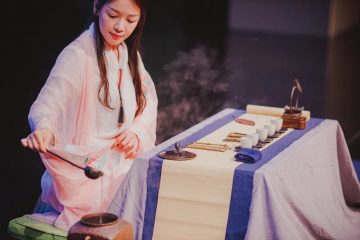
When you quote someone’s words, don’t put it as one long chunk. You should paraphrase it and make it easier for the reader to follow through.
A tea ceremony was held on Tuesday, January 8th, 2019 as the first community event of the new semester. NCHS held this event in order for students to take a better look into one of the most prominent rituals in the Chinese culture and have a better understanding of the country we are living in currently.
Many students may think that drinking tea is an activity among Chinese seniors, especially as an activity that accompanies parents’ gossiping, family meals, and many other daily events. Yet except for these daily casual purposes, tea culture is a traditional Chinese ritual that has existed for thousands of years throughout China’s history, representing majesty, peace, knowledge, and serenity.
After a brief introduction done by Michelle C, NCHS’ President, guest speaker Tongtong started straight away with a demonstration of the tea ceremony.
Tongtong performed along with the peaceful, traditional Chinese music. “Every move of her was so graceful and admirable.” said one of the student audiences, Ben K. Tongtong explained later on that her performance was the original tea ceremony done by the royals in Tang Dynasty, and her utensils were also from Tang Dynasty. After the tea was made, Tongtong gave the tea to three of the volunteers with a full set of tea etiquettes that included bowing, folded hands, and more. One of the volunteers, Gabriel K remarked that the tea was “delicious” and that “it was a cool experience drinking the tea that the professional was brewing on the stage” but unfortunately, he “couldn’t notice any difference between that cup of tea and normal tea”.
Tongtong is the vice secretary of the Guangdong Cultural Association, and also has her own tea agency named Yucha Huicha. The editor has tried to reach her for more information about her motives and beliefs, but she was unfortunately unavailable for comments.
However, many criticisms rose among the community to whether these activities are an effective way for students to learn about the Chinese culture. A few students who preferred to be anonymous gave their opinions when asked about the effectiveness of these events. One student who is ethnically Chinese claimed that “this might be interesting for foreigners but not for us, because we already know about these”, while a foreign student stated that “[she] find[s] it boring as well. It isn’t necessarily useless, but [she doesn’t] learn much about anything.” She also claimed that some of her friends find it “extremely useless” and “they felt like they could have spent that time on something else”. They claimed that there are definitely better and more interesting ways to educate students on these cultures. One junior, Terry M, suggested the solution that “breaking up the event into several blocks in a day or in a week (depending on how long the guest stays) and working with smaller groups will make it more fun and entertaining.”
Regardless of the amount of interests they have, students still recognize NCHS’ good intention behind. Yet it is essential for NCHS to come up with new methods to make the events more interesting and interactive. Do you have any suggestions on how to improve these events? Do you think they are necessary and beneficial? Feel free to comment and leave your thoughts below!